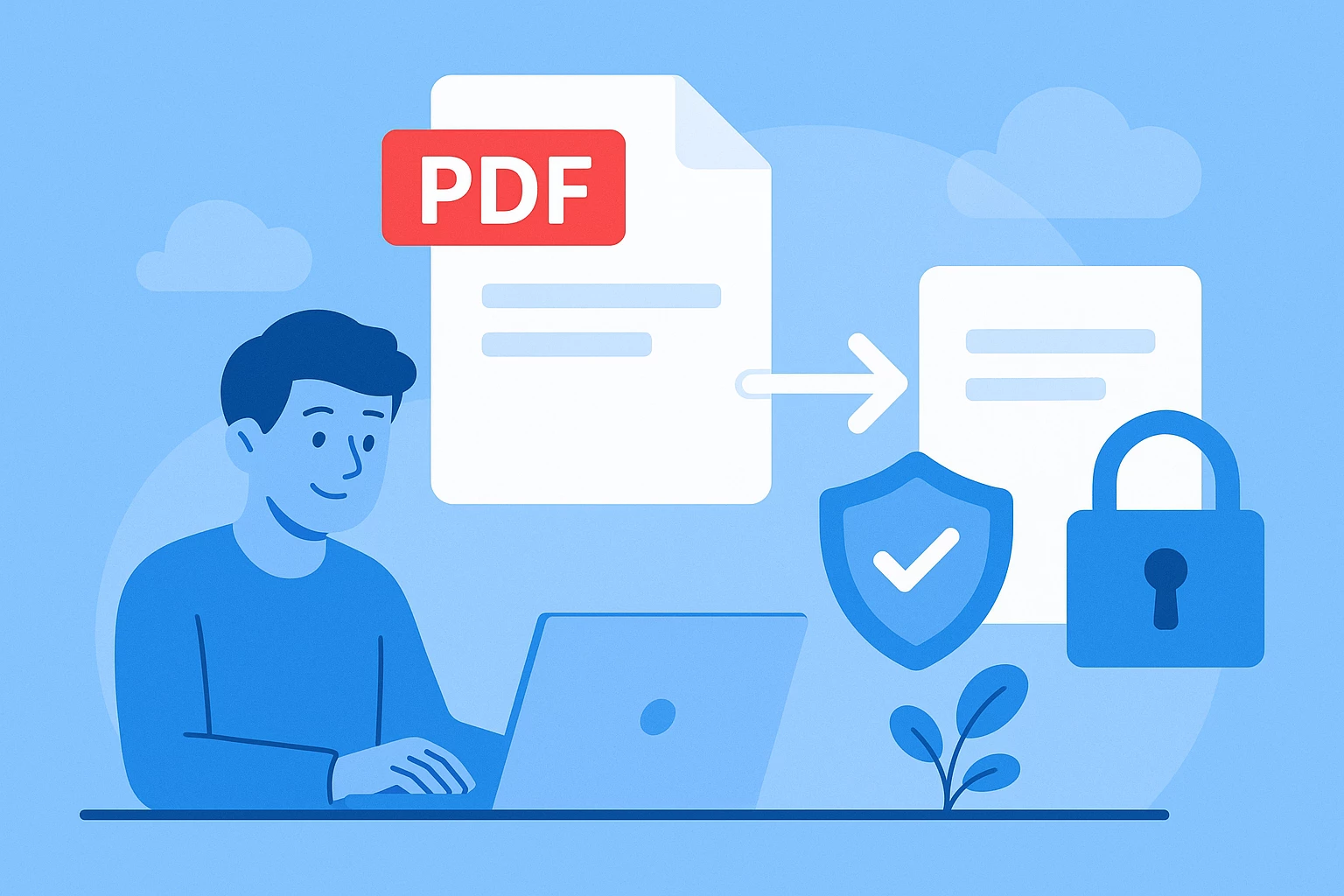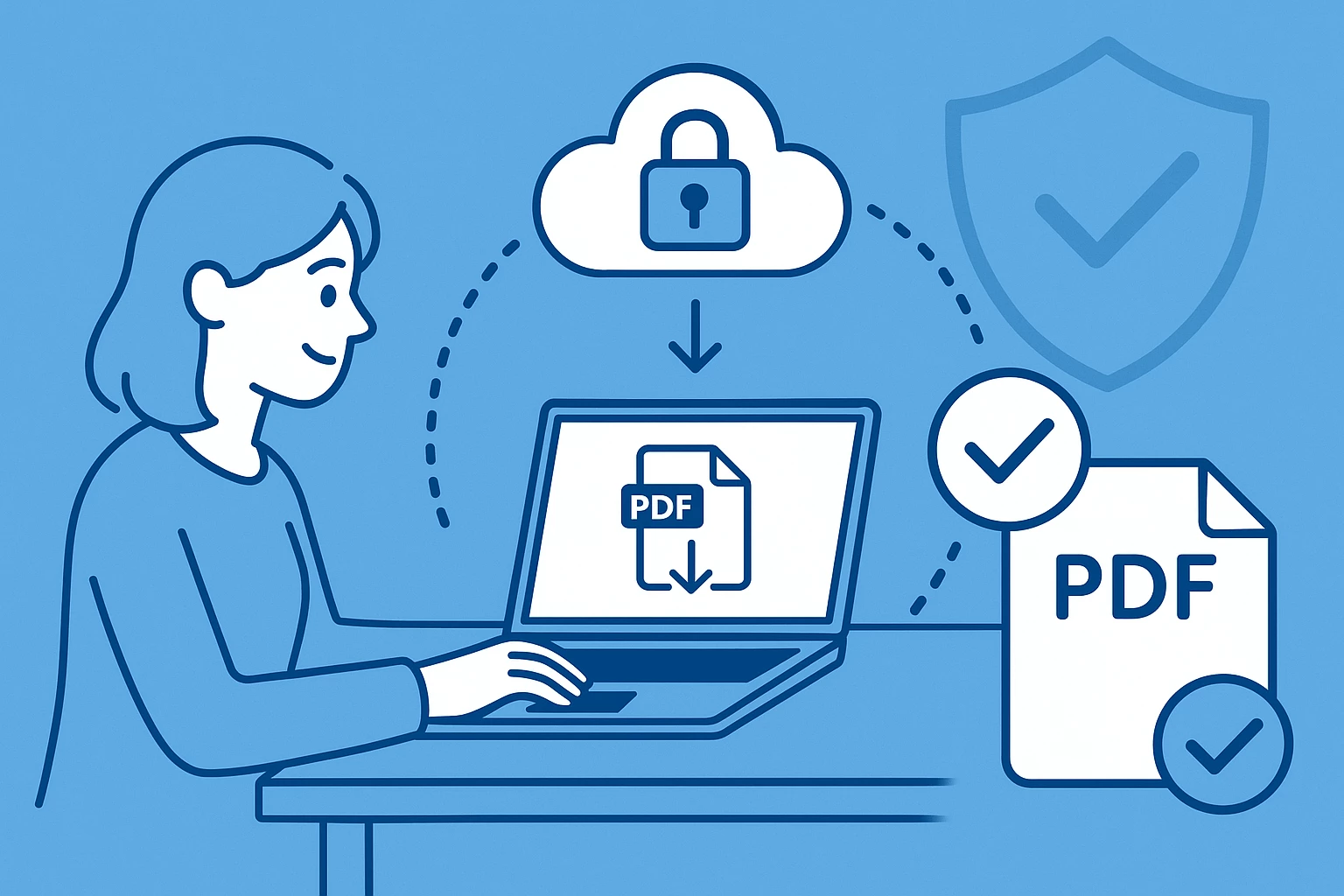
Is Convertio Safe? Honest Review (+ A Top-Rated Alternative for 2025)
When I first discovered Convertio, it felt like the ideal solution for quick file conversions. You upload a document, select the required format, and the tool delivers results within seconds. That’s it!
Over time, though, I started to wonder how safe it really was to share files with any online file converter. In 2025, data security and privacy are too important to ignore, especially for those of us who work with sensitive information.
My honest review takes a closer look at Convertio’s safety, exploring how it handles your files, what risks might exist, and how it compares to other tools on the market.
By the end, you will know if Convertio is a platform you can trust and discover a top-rated alternative that offers the same convenience with better peace of mind.

What is Convertio?
Convertio is an online file conversion tool that supports hundreds of formats for documents, images, audio, and video. Instead of downloading software or learning complicated programs, you simply upload your file, choose the output format, and Convertio processes the conversion in the cloud.

Moreover, the platform works directly in your browser, which makes it accessible from any device with an internet connection.
For most users, the appeal lies in its simplicity and speed. You can convert a PDF to Docs, an MP4 to MP3, or even a PowerPoint to a PDF in just a few clicks. The free plan allows basic conversions with size limits, while paid options unlock features like larger file sizes, faster processing, and priority support.
However, convenience alone does not answer the bigger question of how the platform handles the files you upload or how secure the process really is. In the next section, I’ll take a closer look at these points in detail.
Is Convertio Safe to Use?#
The first time I started using Convertio, safety was not even on my mind. I just needed a quick file conversion, and the tool delivered exactly that. But the more I used it, the more I wondered what happened to my files once I uploaded them. So I decided to dig deeper.
According to Convertio, every file goes through a secure, isolated environment during conversion. The platform promises to delete input files as soon as the process is complete, while the converted files stay on their servers for 24 hours in case you need to download them again.

Also, you can delete them yourself with one click. They use TLS encryption for all data transfers, and the servers comply with ISO 27001 standards and GDPR requirements. On paper, this sounds solid, doesn’t it?
Additionally, I checked what other users had to say. Many people on forums mention using Convertio for years without problems, and I have not found reports of major security breaches involving the platform.
It seems that for everyday tasks like converting a PDF to Word or changing an image format, Convertio handles files responsibly.
Don’t miss our Is Cloudconvert Safe? Safety Review (+ A Trusted Alternative) guide
Security and Privacy Analysis#
When I reviewed Convertio, I wanted to see if its security promises hold up. Uploading a document to any online platform means giving it temporary access to your data, and with data breaches making the news so often, this is not something to take lightly.
I tested Convertio with different file types, looked at how it handles uploads and deletions, and checked what other users had experienced. The platform uses TLS encryption for transfers, processes files on secure servers, and removes them automatically after a set period.
In my tests, files were no longer accessible once that time window ended, and I did not come across any reports of unauthorized access or data leaks.
Based on what I found, Convertio is reasonably safe for personal documents and routine work files. However, if you are dealing with highly sensitive information like legal contracts or financial records, I would still lean toward an offline tool or a service built specifically for secure document handling.
Data Encryption and File Transfer#
The first thing I looked at was how Convertio protects files while they are moving between my computer and its servers. The platform uses TLS encryption for all uploads and downloads. It is the same standard used by banks and e-commerce websites to prevent anyone from intercepting data in transit.
During my tests, I uploaded several documents of different formats and sizes. The transfers were stable, and my browser or security software never flagged any issues. It might seem like a small point, yet many low-quality online converters fail at this very stage and leave connections unprotected, putting user files at risk.
Convertio’s servers also run in ISO 27001-certified environments and comply with GDPR. These certifications are important because they require platforms to follow strict data protection protocols for handling, storing, and processing user files.
I mean, there is one limitation worth noting. Convertio does not offer end-to-end encryption. With end-to-end encryption, files would be encrypted on your device before upload and only decrypted when you download them again, so not even the platform could access them in between.
While TLS encryption is strong, end-to-end protection would give users complete control over their data. If you handle highly confidential files, this is something to keep in mind.
File Storage Policy#
Next, I wanted to see what happens to files after the conversion process is done. According to Convertio, input files are deleted from its servers immediately after conversion, while the converted files remain available for 24 hours. The short window gives you time to download the results if you accidentally close your browser or need extra time to access them.
I tested by uploading several documents and checking the download links after a day. As promised, the files were no longer accessible, which means the deletion process works as described.
So, for everyday use, this system is convenient. You do not have to worry about saving files immediately, and at the same time, they are not stored indefinitely on the company’s servers.

Moreover, security experts often point out that any file stored online, even for a few hours, carries some level of risk if the servers are ever compromised. I did not find evidence of such incidents with Convertio, but offline solutions are generally considered the gold standard for handling sensitive information.
You might also be curious about our Is FreeConvert Safe? Answered (2025 Edition) guide
User Privacy and Third-Party Access#
I also reviewed Convertio’s privacy policy because strong encryption means little if a company quietly shares your data with third parties. The platform clearly states that uploaded files are not shared with anyone outside the conversion process and are not used for analytics or advertising.
While using the tool, I did not notice unnecessary permission requests or unusual data collection. Convertio runs on a GDPR-compliant infrastructure, so it has legal obligations to be transparent about how data is processed, stored, and deleted. This is reassuring because it gives users clear rights to access or remove their data if needed.
Still, I recommend reading the privacy policy yourself before uploading sensitive files. It is always a good idea to know what information is logged, how to delete your files manually, and under what circumstances the company might be required to hand data over to authorities.

User Experience and Trustworthiness#
Beyond technical security, I wanted to see how trustworthy Convertio feels in practice. The website itself looks professional, with no intrusive ads, fake download buttons, or suspicious redirects.
It might sound like a low bar, yet many free converter sites fail here and come across as if they were built to harvest clicks rather than provide a safe service.
I also checked independent reputation tools like ScamAdviser and found that Convertio scores well for legitimacy and safety. Online reviews are mostly positive, with users praising its speed, simplicity, and wide format support.

The most common complaints are about file size limits in the free plan or occasional formatting errors with complex files, but I did not see patterns of complaints about data breaches or misuse of information.
The company is reasonably transparent about its features, pricing, and data handling practices. It does not publish extensive details about its ownership or team, but nothing in my research suggested shady practices or hidden risks.
Convertio Performance Review#
Once I finished looking into Convertio’s security and privacy measures, I wanted to see how the platform performs when you rely on it for real work. Security is essential, but no one wants a painfully slow tool, struggles with common file formats, or leaves you fixing half the document after conversion.
I spent several days testing Convertio with a variety of file types, from simple PDFs to large video files. I compared the free and paid versions to see where the differences became clear.
My focus was on more than just speed because I wanted to understand how accurate, reliable, and user-friendly the platform actually is.
Here is what I found across three key areas:
Conversion Speed and Quality#
Speed was the first thing I wanted to test because it is the main reason people use online converters in the first place. For smaller tasks like PDFs to Word or Word back to PDF, Convertio was almost instant.
Files processed within seconds, and the results matched the originals. Layouts stayed intact, images stayed in place, and text formatting was accurate enough that I could start using the files right away.
For larger files, the results were a little different. A ten-minute MP4 video converted to AVI took longer, but the output quality held up well. There was no obvious loss in resolution or sound clarity, which was a positive surprise because many free tools compress files too heavily, leaving you with low-quality results.
The only area where Convertio struggled was with very complex PowerPoint presentations that had custom fonts, heavy animations, and layered graphics.

Most of the content carried over correctly, but some transitions and design elements did not look exactly like the original version. This is something I have seen with other converters as well, so it is not unique to Convertio.
You can also explore our Is Zamzar Safe? Safety Review (+ Pros, Cons & Alternatives) guide
Supported File Types#
Convertio supports more than 300 formats, so I tested several categories to see how it performs in practice:
- Documents: PDF, Word, Excel, PowerPoint
- Images: JPEG, PNG, SVG
- Audio and Video: MP3, WAV, MP4, AVI
- Other files: EPUB for eBooks, ZIP archives
All the files I tried converted successfully without compatibility problems. The tool automatically detects the input format, so you only need to select the desired output format.
For most users, this range is more than enough. Students, small businesses, and professionals will find it covers almost every format they need. The only exceptions might be highly specialized formats, such as CAD files or scientific data, where dedicated software would still be required.
Free Plan vs Paid Plan#
The free version of Convertio works fine for small, occasional conversions, but it has clear limits. Files are capped at 100 MB, large files take longer to process, and there is a daily limit on the number of conversions you can run.
When I compared both plans with the same large video file, the difference was obvious. On the free plan, I had to split the file into smaller parts. The paid version converted the entire file in one run, processed it much faster, and offered batch conversions without restrictions.
However, there is one area where Convertio has received negative feedback: its strict no-refund policy. Some users reported being unable to get refunds even after accidental purchases, which is worth keeping in mind if you are considering an annual plan.

For casual users, the free version is enough. For frequent or heavy use, the paid plan saves time and removes most limits, but the refund policy means you should be certain about your purchase before subscribing.
Best Convertio Alternative for 2025#
After reviewing Convertio’s strengths and limitations, it makes sense to highlight a platform that takes file conversion a step further. MConverter stands out in 2025 as a smarter choice for users who want both convenience and stronger control over their data.
MConverter processes every file in its own isolated environment, keeping each conversion fully independent and secure. Files remain private throughout the process, with no third parties involved at any stage.

The platform also follows a simple, user-first principle: files belong to you, not to the software. Once the conversion is complete, they are automatically deleted from the servers within four hours, and you can remove them manually right after downloading if you prefer.
When a file fails to convert, MConverter allows temporary access for troubleshooting, but only under strict internal rules. As soon as the issue is resolved, the file is permanently removed, leaving no trace behind.
All transfers are protected with modern TLS encryption, and all processing happens in-house, so your files are never shared, sold, or used for advertising.

With millions of successful conversions and consistently positive user feedback, MConverter combines security, performance, and ease of use in one platform. For anyone looking for a more privacy-focused and efficient alternative to Convertio, it delivers exactly that.
You can also read our Top 10 Cloudinary Alternatives for 2025 (Free & Paid) guide
Final Thoughts: Is Convertio Worth It?#
Convertio does what it promises: it converts files quickly, supports a wide range of formats, and keeps the process simple enough for anyone to use. For basic, occasional conversions, especially smaller documents or images, it gets the job done without complications.
The platform, however, is not without its limits. File size restrictions on the free plan, no end-to-end encryption, and some performance drawbacks with larger or more complex files make it less ideal for heavy or security-sensitive workloads. These issues do not make it unusable, but they do leave room for improvement.
For users who want more control over privacy, faster processing, or advanced features like bulk conversions, MConverter provides a more capable alternative. It keeps the same ease of use while adding stronger security measures and performance improvements for professional or frequent workflows.
So, is Convertio worth it? For casual users with simple needs, yes. For anyone who values speed, security, and flexibility in 2025, MConverter offers a better long-term choice.
Can Convertio Give You Viruses?#
Convertio itself is considered safe, and there are no reports of it distributing malware through its platform. During testing, the official site did not show any signs of malicious redirects or hidden downloads, and independent security checks classify it as legitimate.
The main risks come from two areas. First, there are fake websites designed to look like Convertio that can deliver harmful files if you use them instead of the official site. Second, if you upload a file that is already infected, converting it will not remove the virus. To stay secure, make sure you are on the official Convertio website and scan your files with antivirus software before and after conversion.
Does Convertio Store Files Permanently?#
No, Convertio does not keep your files permanently. According to the platform’s policy, input files are deleted immediately after conversion, while the converted files remain on the servers for 24 hours. This gives you time to download them, but they are then removed automatically. You can also delete them manually at any time if you prefer.
For users concerned about privacy, it is important to note that the files are processed in secure environments and are not shared with third parties. Once the deletion period ends, there is no way to recover the files from Convertio’s servers.
Is Convertio Safe for Confidential Business Documents?#
Convertio uses TLS encryption for file transfers and processes files in secure environments, which makes it safe enough for everyday documents. However, it does not offer end-to-end encryption, and files stay on the servers for up to 24 hours before being deleted automatically.
For most regular business files, this level of security is sufficient. If the documents contain highly sensitive financial, legal, or client information, it is better to use an offline tool or a service designed specifically for confidential data to maintain full control over your files.
Can You Use Convertio Offline?#
No, Convertio is an online platform and requires an internet connection to work. All file conversions take place on its servers, so you cannot use the tool without access to the internet.
If you need to convert files offline, you would need dedicated software installed on your computer. Offline tools keep everything on your device and are often preferred for highly sensitive documents or when internet access is limited.
How Does Convertio Compare With Desktop Converters?#
Convertio offers the convenience of quick, browser-based file conversions without the need to install software. It supports a wide range of formats, works on any device with internet access, and does not require ongoing maintenance or updates from the user.
Desktop converters, on the other hand, keep everything on your computer. They typically provide faster processing for large files, work offline, and give you full control over file security since nothing leaves your device. However, they often require paid licenses, regular updates, and take up storage space.
In short, Convertio is better for quick, simple tasks when convenience matters most, while desktop converters are more suitable for high-volume, sensitive, or offline work.
Is Convertio Free, or Do You Need to Pay?#
Convertio offers both free and paid plans. The free version lets you convert smaller files with basic features, which is enough for occasional use. However, it has limitations on file size, the number of daily conversions, and processing speed for larger files.
The paid plans remove these restrictions, support batch conversions, handle much larger files, and offer faster processing. They are designed for users who convert files frequently or work with heavier workloads.
Does Convertio Collect Personal Data?#
Convertio collects only the information necessary to run its services, such as files you upload for conversion and basic technical details like browser type or language settings. These files are processed for conversion purposes only and are automatically deleted within the set retention period, usually 24 hours for converted files and immediately for input files.
The platform states that it does not sell user data or share it with third parties for advertising. For anyone handling sensitive documents, it is still a good idea to review Convertio’s privacy policy directly to understand exactly what information is collected and how long it is stored.
About the author
Mihael joined MConverter as a co-founder in 2023, bringing a vision to transform a tech tool into a product company built around meaningful user experience. With roots in B2B sales, product development, and marketing, he thrives on connecting the dots between business strategy and customer needs. At MConverter, he shapes the bigger picture - building the brand, inspiring teams, and pushing innovation forward with a can-do mindset. For Mihael, it’s not just about file conversions, but about creating experiences that deliver real impact.
Check out more articles

Is Anyconv Safe: Anyconv Review – Is It Safe or Risky?

Is iLovePDF Safe? In-Depth Review – Is It Safe or Should You Avoid It?












